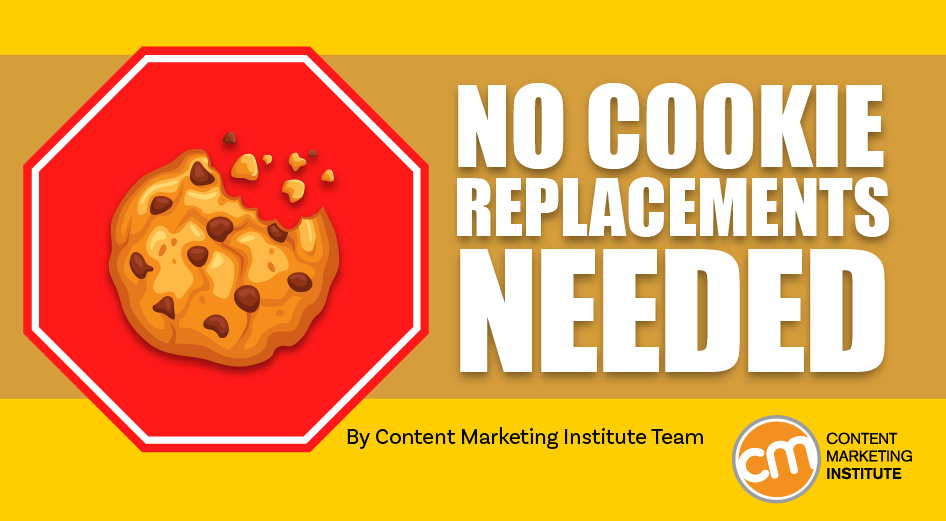Google Did a Cookie-Free Experiment. Ought to the Outcomes Matter to You?

[ad_1]
 Third-party cookies don’t crumble simply.
Third-party cookies don’t crumble simply.
In 2021, Google introduced 2022 as the tip of third-party cookies in its Chrome web browser. It didn’t have a alternative in 2022, so it punted the disappearance down the highway to 2024. And now, one other delay might be on the horizon.
A cookie-less future continues to be anticipated, however what does that imply for entrepreneurs (and @Google) now, asks @Robert_Rose through @CMIContent. Click on To Tweet
However although private information crumbs nonetheless depart trails that entrepreneurs and advertisers can observe, Google nonetheless expects – and experiments for – a cookie-less future.
Must you regulate your content material advertising to answer their findings or do one thing else?
CMI’s chief technique advisor Robert Rose has some ideas. Get his take on this week’s CMI Information video, or hold studying for the highlights:
What is going to Google serve after cookies disappear?
In January 2022, Google introduced FLEDGE – First Domestically Executed Choices over Teams Experiment. It might take too lengthy to elucidate intimately the five-component system. Nonetheless, ostensibly it places customers (i.e., folks browsing the online) into curiosity teams primarily based on their content material consumption. Advertisers might goal matter curiosity teams as a substitute of people.
However the advert world – principally the publishers who promote advertisements – didn’t suppose FLEDGE was that nice. So Google advanced FLEDGE into its Protected Viewers API, which they shared earlier this month.
Now if all this discuss makes your head spin, that’s OK. However let’s break down one thing extra concrete that Google shared this previous week. It launched the outcomes of its promoting checks for its interest-based viewers options. They use Google’s Privateness Sandbox’s matters API to faucet right into a principally nameless aggregated set of web information. It additionally makes use of first-party identifiers corresponding to Writer Offered IDs.
The experiment assessed the efficiency of advertisements utilizing information from third-party cookies vs. advertisements utilizing its interest-based viewers options with privacy-preserving alerts. Advert spending for the internet-based viewers outcomes was down 1% to three% in comparison with third-party-cookie outcomes. Nonetheless, click-through charges remained inside 90% of the established order.
The experiment signifies outcomes for advertisements utilizing interest-based viewers options should not that a lot better or worse than outcomes for advertisements utilizing third-party cookies.
@Google’s experiment testing advertisements with its interest-based viewers options in comparison with third-party cookies introduced “meh” outcomes, says @Robert_Rose through @CMIContent. Click on To Tweet
Is that excellent news?
“Whereas these experiments present enhancements in interest-based viewers options, they are surely asking the improper query,” says CMI’s chief technique advisor Robert Rose.
The indifference of cookies
Google’s experiment – and entrepreneurs’ curiosity in a cookie-free resolution – stems from the idea that focusing on audiences utilizing third-party cookies has been their most suitable option.
However that conclusion doesn’t maintain up with the analysis, Robert says.
In 2019, analysis discovered a writer’s entry to a consumer’s cookie might enhance income by about 4%, which interprets to $0.00008 per advert – sure, eight-hundred-thousandths of a greenback.
Having a consumer’s cookie results in a income enhance of about $0.00008 per advert, in accordance with 2019 analysis, says @Robert_Rose through @CMIContent. Click on To Tweet
Mix that discovering with analysis from Dr. Augustine Fou, and the significance of cookies diminishes considerably. Fou finds whereas extra related advertisements work higher (i.e., focusing on a publication class your viewers frequents), hyper-targeting via private info breaks down in effectiveness after greater than three parameters of information.
That leads Robert to ask: “Who’s getting paid to promote the additional private information parameters that make shopping for advertisements costlier?
“It’s apparently not the publishers. Might or not it’s that the large platforms like Google and Fb combination the info?”
You don’t want a cookie alternative
Given all that, entrepreneurs ought to take a breath. Cease fretting concerning the cookie-replacement debate and begin conducting your personal experiments.
“Run checks of how your model advertisements, content material sponsorships, and different types of paid media that don’t use third-party cookies or goal carry out,” Robert says.
He additionally advises investing extra sources and time in creating your first-party information, so that you don’t need to concern your self about advert platforms and may higher goal and personalize the content material the advertisements hyperlink to.
What are you doing with focused promoting? How are you coping with the approaching disappearance of third-party cookies, every time that’s? Tell us within the feedback.
HANDPICKED RELATED CONTENT:
Cowl picture by Joseph Kalinowski/Content material Advertising and marketing Institute
[ad_2]
Source_link






